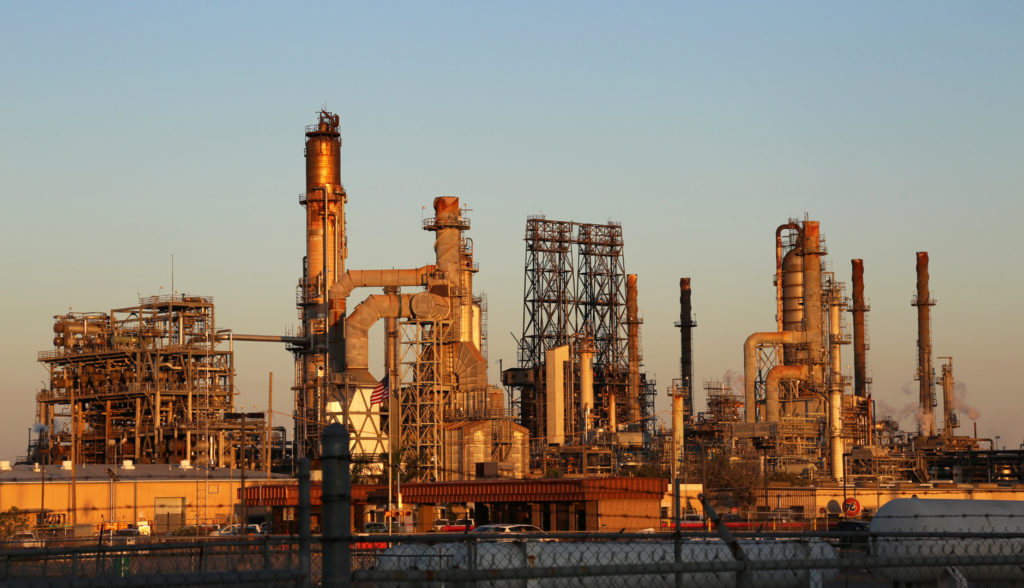Blog
The Economic Impact of Climate Change Rattles the Oil Industry
Research shows that global warming will hit the American economy hard, particularly in the South.

According to Department of Energy data, six out of the 15 biggest energy-related carbon emitters are states in the Southeast, and lawmakers from those states have been among the most powerful opponents of public policies designed to fight climate change. Those lawmakers have typically argued that cracking down on carbon emissions could reduce economic growth — but now, the Richmond branch of the Federal Reserve Bank is promoting a study suggesting that refusing to combat climate change could utterly devastate the South’s entire economy.
Researchers homed in on the economic effects of heat, documenting a correlation between higher temperatures, lower factory production rates, lower worker productivity and lower economic growth. One finding they cite: “The occurrence of six or more days with temperatures above 90 degrees Fahrenheit reduces the weekly production of U.S. automobile manufacturing plants by an average of 8 percent.”
While researchers acknowledge some positive economic aspects of higher temperatures in colder seasons, they conclude that the so-called “summer effect” of excruciatingly high temperatures in the summer months is the biggest factor, “leading to a negative net economic effect of rising temperatures.”
For the American economy, the Richmond Fed says the research shows that “higher summer temperatures could reduce overall U.S. economic growth by as much as one-third over the next century, with Southern states accounting for a disproportionate share of that potential reduction.”
While many of the South’s most influential congressional lawmakers continue to block climate change legislation, at least one of the region’s most politically powerful forces now appears to acknowledge the threat: the fossil fuel industry.
The Associated Press reports that the oil industry is now pushing for government-funded storm barriers to protect its refineries and infrastructure along the Gulf Coast. Texas lawmakers such as Sen. Ted Cruz and John Cornyn – both leading critics of government spending – have backed the funding initiative.
Cruz has publicly challenged the science of climate change, while Cornyn has applauded the Trump administration for pulling out of the Paris international accord on climate change – so their support for funding efforts to mitigate the effects of climate change could be seen as a bit of a shift for two of the South’s most powerful public officials.
The lawmakers, however, have not signaled they are willing to back major efforts to reduce the country’s use of the fossil fuel industry’s products, whose carbon emissions produce climate change in the first place.
Copyright Capital & Main

-

 The SlickJanuary 27, 2026
The SlickJanuary 27, 2026The One Big Beautiful Prediction: The Energy Transition Is Still Alive
-

 Column - State of InequalityJanuary 29, 2026
Column - State of InequalityJanuary 29, 2026Are California’s Billionaires Crying Wolf?
-

 Latest NewsFebruary 3, 2026
Latest NewsFebruary 3, 2026Amid the Violent Minnesota Raids, ICE Arrests Over 100 Refugees, Ships Many to Texas
-

 Dirty MoneyJanuary 30, 2026
Dirty MoneyJanuary 30, 2026Amid Climate Crisis, Insurers’ Increased Use of AI Raises Concern For Policyholders
-

 Featured VideoFebruary 4, 2026
Featured VideoFebruary 4, 2026Protesters Turn to Economic Disruption to Fight ICE
-

 The SlickFebruary 2, 2026
The SlickFebruary 2, 2026Colorado May Ask Big Oil to Leave Millions of Dollars in the Ground
-

 Column - State of InequalityFebruary 5, 2026
Column - State of InequalityFebruary 5, 2026Lawsuits Push Back on Trump’s Attack on Child Care
-

 Column - California UncoveredFebruary 6, 2026
Column - California UncoveredFebruary 6, 2026What It’s Like On the Front Line as Health Care Cuts Start to Hit

